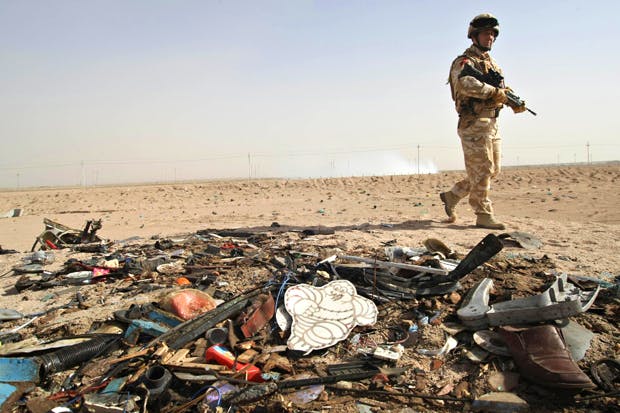‘If it falls apart, everything falls apart in the region’
— Note from Tony Blair to George W. Bush, 2 June 2003.
The extraordinary length of time that we have had to wait for Sir John Chilcot’s report into the 2003 invasion of Iraq has not made the end result any more satisfying. For some, nothing less than the indictment of Tony Blair on war crime charges would have sufficed. As for Blair himself, and many of those who surrounded him when the decision was made to remove Saddam Hussein from power, they will go on believing until their dying day that not only was the war just, but there was nothing much wrong with the way in which it was sold to the public and to Parliament.
This magazine supported the Iraq invasion and invited sceptics to explain why the world would be a better place were Saddam allowed to continue in power. What we didn’t know then was the calamitous lack of a plan for what would follow. These were difficulties that, as the Chilcot report says, could have been foreseen. We learn that Sir Jeremy Greenstock, when ambassador to Baghdad, concluded that preparations ‘were abject: wrong analysis, wrong people.’ So toppling Saddam created a vacuum which was filled by sectarian bloodshed and (eventually) the Islamic state.
There is no doubt that Blair misled us about the case for war. He felt that he had to. He was desperate to have the United Nations endorse George W. Bush’s invasion and the lawyer in him tried to construct an argument about weapons of mass destruction. Foolishly, he pledged support to Bush too early on — leaving him no leverage. But instead of asking why we fought in Iraq, we should ask why we lost. The answer is that Blair tried to fight two wars on a peacetime budget. Unwilling to pay for a proper military, he had soldiers driving over roadside bombs in Belfast-era Land Rovers. And worse, the city of Basra — nominally under British control — fell under the control of Shiite death squads because there were nowhere near enough troops to stop the looting and keep the peace. Brigadier Graham Binns, commanding the 7th Armoured Brigade which had taken Basra city, told the inquiry that he had concluded that ‘the best way to stop looting was just to get to a point where there was nothing left to loot’.
Six weeks after the fall of Saddam, Kevin Tebbit, permanent secretary at the MoD, wrote about an ‘overwhelming sense of the scale and complexity of the reconstruction required — political, security, infrastructure — and the continuing lack of a strategy to carry this forward’. As Blair reduced troops from 46,000 to 25,000, hoping to present a narrative of success at home, the terrorisation of Basra continued. Just two months into the invasion, the MoD warned that ‘more organised opposition to the Coalition may be emerging’ due to discontent about failure to deliver security.
Crucially, the army top brass was as much to blame as Blair’s government: it stuck to its recommendations about troop withdrawal and refused to reconcile itself with the bloody reality — even when militia-men were killing 200 Iraqis a month. It did not want to admit that it was failing; too much was being asked. Before the Iraq war, Blair had been told by the military that it could manage two medium-sized operations (such as Afghanistan and Iraq) for no more than six months. By May 2005, it had been doing so for two years. And in January 2006, the Blair government decided to deploy troops to Helmand province in Afghanistan.
In May 2006, it was clear that the British were being defeated by ragtag Shiite militias. The Americans were appalled. General Sir Michael Jackson, then head of the British Army, explained in a memo that the Americans believed that ‘the UK is motivated more by the short-term political gain of early withdrawal than by the long-term importance of mission accomplishment’. How right this was. When Britain eventually withdrew from Basra, the army cut a deal with one of the Shiite death squads: it would release prisoners in return for not being fired upon as its soldiers retreated. It was a humiliation. Britain had abandoned Basra to the militiamen.
The Chilcot report is full of such damning memos and emails, confirming what we already suspected. But the real question is: have any lessons been learned? Since then, defence spending has been cut back — and still David Cameron has been keen for military ventures in Libya and Syria. Like Blair, he refused to put in the military resources needed after deposing Gaddafi. Our dangerously low defence spending virtually guarantees another similar debacle at some time in the future.
Political debate relies on robust exchanges. It would not serve democracy if candidates for political office felt that every single assertion needed to be backed up by objective evidence. But there is a huge difference between campaigning and governing. When it comes to Parliament making grave decisions such as whether or not to go to war, the information put before it should be unimpeachable. Tony Blair treated winning Parliament over to his military adventure in Iraq like just another election to be won. It was an error of judgment for which he and many others have suffered ever since.
Got something to add? Join the discussion and comment below.
Get 10 issues for just $10
Subscribe to The Spectator Australia today for the next 10 magazine issues, plus full online access, for just $10.














Comments
Don't miss out
Join the conversation with other Spectator Australia readers. Subscribe to leave a comment.
SUBSCRIBEAlready a subscriber? Log in